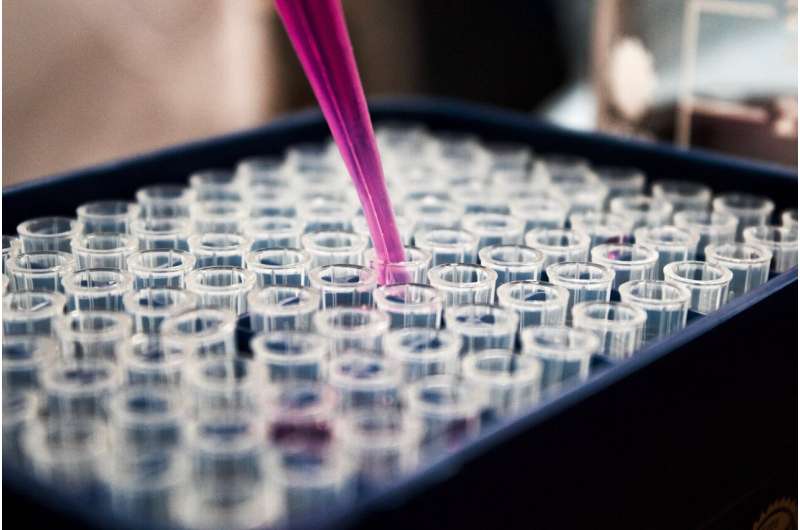This article has been reviewed according to Science X's editorial process and policies. Editors have highlighted the following attributes while ensuring the content's credibility:
fact-checked
proofread
Leukemia drug passes final trial phase with flying colors

A medication to treat chronic myeloid leukemia (CML) has shown its potential to become the new frontline therapy for people living with the life-threatening blood cancer.
Asciminib, is known by the brand name Scemblix, produced by Swiss-based, Novartis Pharma AG. It works by blocking the action of an abnormal protein that signals cancer cells to multiply and was designed to be both highly potent and specific, minimizing side effects and toxicity.
Following the 2022 success of the world-first clinical trial (ASCEND) of asciminib for newly diagnosed CML patients, run out of SAHMRI and the Royal Adelaide Hospital, the drug has now completed the primary analysis of the phase III global randomized control study.
The study involved 405 men and women with a median age of 52, who'd been recently diagnosed with CML. They were treated with either asciminib or the best currently available therapies, to compare treatment efficacy and safety.
Presenting the findings at the American Society of Clinical Oncology (ASCO 2024) Annual Meeting in Chicago, SAHMRI's Professor Tim Hughes, who has been integral to validating and improving the drug over the past decade, says the latest trial results showed asciminib may be a better option for people with new cases of CML compared to current standard treatments.
"We're excited, because this trial demonstrates that asciminib can achieve better early responses and importantly, excellent safety and tolerability," Prof Hughes said.
"Asciminib could soon become the treatment of choice for many newly diagnosed CML patients. That will mean many people can achieve good remissions while continuing their normal work and leisure activities, such a contrast to the patient experience with earlier drugs."
Treatment of chronic phase CML requires the long-term use of tyrosine kinase inhibitors (TKIs) to prevent the disease from progressing to a more aggressive phase. However, around half of all patients will need to switch TKIs if the CML stops responding to treatment or if the treatment cannot be tolerated due to side effects.
Between 20% and 30% of patients have significant intolerance to TKI therapy, which may not improve after switching to a different medication.
To measure how well treatment worked, researchers assessed individual's major molecular response (MMR). Patients who have an MMR have a near-normal survival and reaching MMR early provides reassurance that they are in a "safe haven."
"After 48 weeks, 68% of participants on asciminib had achieved an MMR, compared to 49% on other TKIs," Prof Hughes said.
"A deep molecular response was also observed in 39% of those taking asciminib in comparison to 21% in the control group. People who have a deep molecular response may eventually be considered in remission and may be able to stop treatment altogether.
"Additionally, asciminib has shown lower rates of discontinuation, dose adjustment and treatment interruptions, indicating better tolerance. Patients who took asciminib also had a low risk of heart attacks and strokes, a serious side effect of TKIs, which occurred in only 1% of participants."
Researchers will continue to follow the participants to understand the long-term safety of asciminib and determine if reaching an earlier MMR continues to be a way to predict better outcomes for patients.
Future studies will measure overall survival, progression-free survival, and how many patients can achieve treatment-free remission.

















